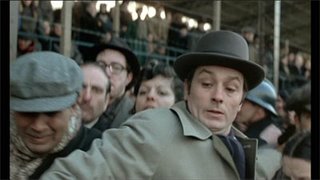
This film opens with an incredibly disturbing scene: a woman is undergoing a medical examination… standing and naked in a vast room with a nurse to take notes, a ‘doctor’ measures her facial features in order to determine her status: real French or Jew… this open scene sets the tone of the film, though the narrative is far more complex than would first seem…

1942, France. The country is divided into the Nazi occupied North and the Vichy controlled South. The Nazi racial policy is implemented in both. Mr Klein is a Catholic art dealer, making money out of Jews fleeing the regime.
Then ANOTHER Mr Klein – a Jew and a communist – deliberately confuses the machinery that is Nazi France as to the identity of the first Mr Klien… a cat and mouse games ensues… all the familiar Losey traits are here: mirrors, staircases, and shadows… and these elements fuse effortlessly with the narrative to forge a film marrying form and content to explore the ambiguity of identity: personal, national, racial… the mirrors reflect the actual status of the two Mr Kliens: they look the same, people confuse them… nothing is what it seems and the camera work reminds one of Se7en.

This, the final film in the Losey triptych, reminds one of Hitchcock’s North by Northwest… however, it is far darker. It is also one of Losey's more political films… an investigation of France’s complicity during the dark years of WW2… an incredible piece of work from 1976 and the beginning of Losey’s final phase of movie making, leaving the UK behind and working in France.
Film introduced by David Deamer.
Labels: David Deamer, Joseph Losey, Monsieur Klein, WWII



1 Comments:
I was surprised by this film. I spent a long time not liking it. I suppose I was annoyed at the restrictive use of the camera after the way it roamed in the other films. Also the colour, although it wasn't the 'worst use of colour in any film', was bad I think more because of the degradation of the VHS than directorial intention. However, there were elements I enjoyed.
Dave pointed out the Kafkaesque rendering of the protagonist's situation. I agree with that totally. I think the bureaucratic machinery in action is so blindly efficient that it didn’t matter whether M. Klein was a Jew or not. The process was in place. Never mind that it was M. Klein (our M. Klein) that initiated the process itself.
In this way, I reminds me that the thing I find most horrifying about the Holocaust is not the existence of 'evil' but of the 'machine'. A machine follows orders better than a dog. Eternally accurate and if we don't like the results, that's called human error. Programs. Pogroms.
The ending of Monsieur Klein highlighted this in a stark and brutal way, in a closing sequence that's still a little bit with me.
Vee
Post a Comment
<< Home